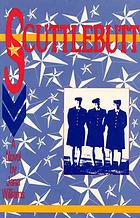The GLBTRT has been reviewing books and movies in its newsletter since the early 1990s. Trace the evolution of queer publishing through these historic reviews. This review was originally published in Vol. 3, No 3 & 4 Spring/Summer 1991.
 Williams, Jana. Scuttlebutt. Firebrand Books, 1990. Paper. $8.95. (ISBN 0-932379-88-5) Library Binding. Adult. $18.95. (ISBN 0-932379-89-3)
Williams, Jana. Scuttlebutt. Firebrand Books, 1990. Paper. $8.95. (ISBN 0-932379-88-5) Library Binding. Adult. $18.95. (ISBN 0-932379-89-3)
“Scuttlebutt” — military slang for gossip or news.
It is a bit unnerving to review a book about women in military training one week after the commencement of the Persian Gulf War. It was especially disconcerting to do this after reading in the newspapers about the San Diego woman in the Navy who was discharged recently because she announced publicly that she was a lesbian.
This first novel is a thinly-disguised autobiographical view of the author’s own passage through the Navy’s boot camp for women in the early 70s. Perhaps to avoid having this account appear dated, the outside world does not impinge much on the world of the bootcamp, although anti-war demonstrations and the burgeoning women’s rights movement must have been in the news then. Given the time (and the place – the South), the issue of black women in the service is presented sensitively.
Seaman Recruit Weston meets her fellow recruits in winter, and spends the next ten weeks learning. She learns military language, Navy rules and regulations, and how to spit polish shoes, among other essential tools. She also learns about racism, friendship, and homophobia. In the end, she may have learned enough to come out to herself.
This is a fascinating account, using the author’s point of view almost exclusively. She shares it all with us–the surge of power as she’s selected acting recruit commander, her homesickness, her growing feeling that the Navy wanted them all to believe that it owned their lives. The incidents she reports, whether funny or sad, sound all too true. My favorite was the occasion involving the contraband “toothbrush holder” and its aftermath. That account moved from high humor to anguish, a difficult accomplishment for a new writer. The characters are believable, from the street-wise tough girl to the poor girl hoping to improve the life of her family back home, and Weston herself – not really sure why she enlisted. The variety of voices makes the story move well.
The book would be a good place to go to put “flesh” on the statistics involving women in the military or military training. While it is not a specifically lesbian book, it displays a sense of growing awareness of  women, women’s rights, and even lesbian rights.
Reviewed by Susan Lee Sills
University of California
Irvine, California
